#aramean
Text
The Syriac language is a dialect of Aramaic that originated in ancient Mesopotamia and has historically been used by various Christian communities, particularly those in the Middle East, such as Syriac Orthodox, Assyrian Church of the East, and Chaldean Catholic Church. It has its own unique script and literary tradition, and it has been used as a liturgical language in some Christian denominations.
Syriac is a later development of Aramaic.
Aramaic, The language spoken by Jesus Christ.
A Semitic language closely related to Syriac.
📍Our Lady of Lebanon, Lebanon.
#christian#jesus#christian blog#christianity#jesus christ#god#bible#bible verse#love#faith#aramaic#syriac#syriac language#aramean
33 notes
·
View notes
Text
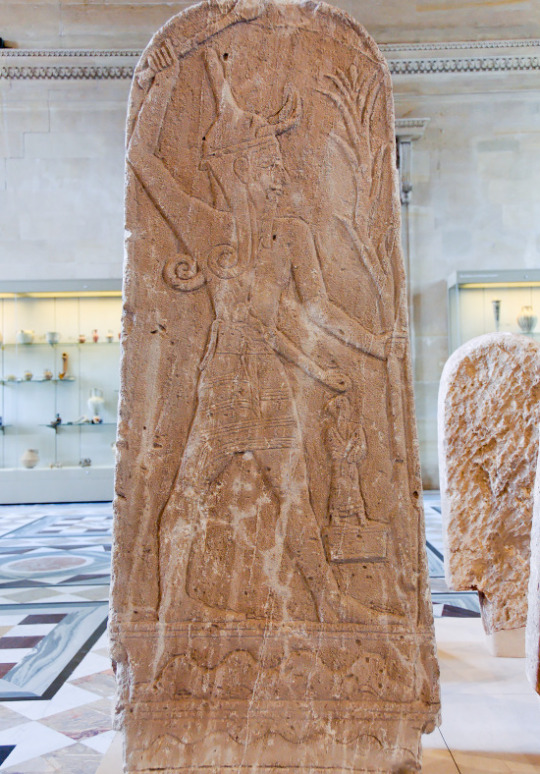
Baal Hadad, God of Storms and Fertility
Stele from Tel Burna, Shephelah
c. 1400 BCE
Source: The Louvre
#baal#hadad#balu#haddu#canaan#canaanite#canaanite paganism#canaanite polytheism#canaanite gods#phoenician#phoenician paganism#phoenician polytheism#phoenician gods#aramean#aramean paganism#aramean polytheism#aramean gods#natib qadish#pagan#paganism#polytheism#magic#witchcraft#occult
98 notes
·
View notes
Text
Deuteronomy Chapter 26
This chapter is about the first fruits, tithes, & following God's commands. This chapter covers these topics after the ancient Israelites got into the Promised Land.
This chapter is about the first fruits, tithes, & following God’s commands. This chapter covers these topics after the Israelites go into the Promised Land. Also, making sure that God’s commands are being heeded because the Israelites are ‘special.’ (We aren’t going to get into a religious/political debate about this. That’s not what this blog is about. That’s for others to discuss & debate. Just…

View On WordPress
#Aramean#bible#Deuteronomy 26#Egyptians#First Fruits#Levites#Old Testament#Produce#Promised Land#tithes
0 notes
Photo
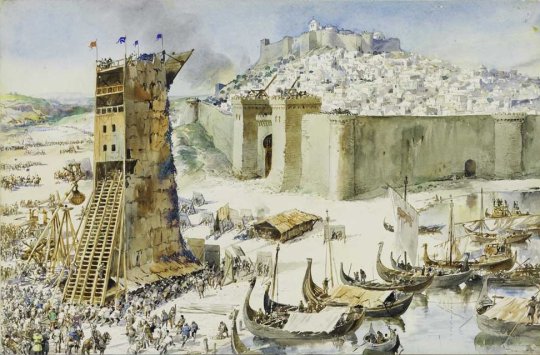
The Siege Lifted
1 Then Elisha said, Hear ye the word of the Lord; Thus saith the Lord, To morrow about this time shall a measure of fine flour be sold for a shekel, and two measures of barley for a shekel, in the gate of Samaria.
2 Then a lord on whose hand the king leaned answered the man of God, and said, Behold, if the Lord would make windows in heaven, might this thing be? And he said, Behold, thou shalt see it with thine eyes, but shalt not eat thereof.
3 And there were four leprous men at the entering in of the gate: and they said one to another, Why sit we here until we die?
4 If we say, We will enter into the city, then the famine is in the city, and we shall die there: and if we sit still here, we die also. Now therefore come, and let us fall unto the host of the Syrians: if they save us alive, we shall live; and if they kill us, we shall but die.
5 And they rose up in the twilight, to go unto the camp of the Syrians: and when they were come to the uttermost part of the camp of Syria, behold, there was no man there.
6 For the Lord had made the host of the Syrians to hear a noise of chariots, and a noise of horses, even the noise of a great host: and they said one to another, Lo, the king of Israel hath hired against us the kings of the Hittites, and the kings of the Egyptians, to come upon us.
7 Wherefore they arose and fled in the twilight, and left their tents, and their horses, and their asses, even the camp as it was, and fled for their life.
8 And when these lepers came to the uttermost part of the camp, they went into one tent, and did eat and drink, and carried thence silver, and gold, and raiment, and went and hid it; and came again, and entered into another tent, and carried thence also, and went and hid it.
9 Then they said one to another, We do not well: this day is a day of good tidings, and we hold our peace: if we tarry till the morning light, some mischief will come upon us: now therefore come, that we may go and tell the king's household.
10 So they came and called unto the porter of the city: and they told them, saying, We came to the camp of the Syrians, and, behold, there was no man there, neither voice of man, but horses tied, and asses tied, and the tents as they were.
11 And he called the porters; and they told it to the king's house within.
12 And the king arose in the night, and said unto his servants, I will now shew you what the Syrians have done to us. They know that we be hungry; therefore are they gone out of the camp to hide themselves in the field, saying, When they come out of the city, we shall catch them alive, and get into the city.
13 And one of his servants answered and said, Let some take, I pray thee, five of the horses that remain, which are left in the city, (behold, they are as all the multitude of Israel that are left in it: behold, I say, they are even as all the multitude of the Israelites that are consumed:) and let us send and see.
14 They took therefore two chariot horses; and the king sent after the host of the Syrians, saying, Go and see.
15 And they went after them unto Jordan: and, lo, all the way was full of garments and vessels, which the Syrians had cast away in their haste. And the messengers returned, and told the king.
16 And the people went out, and spoiled the tents of the Syrians. So a measure of fine flour was sold for a shekel, and two measures of barley for a shekel, according to the word of the Lord.
17 And the king appointed the lord on whose hand he leaned to have the charge of the gate: and the people trode upon him in the gate, and he died, as the man of God had said, who spake when the king came down to him.
18 And it came to pass as the man of God had spoken to the king, saying, Two measures of barley for a shekel, and a measure of fine flour for a shekel, shall be to morrow about this time in the gate of Samaria:
19 And that lord answered the man of God, and said, Now, behold, if the Lord should make windows in heaven, might such a thing be? And he said, Behold, thou shalt see it with thine eyes, but shalt not eat thereof.
20 And so it fell out unto him: for the people trode upon him in the gate, and he died.
— 2 Kings 7 | King James Version (KJV)
The King James Version Bible is in the public domain.
Cross References: Genesis 7:11; Leviticus 13:45-46; Joshua 7:21; Joshua 8:4; Judges 7:21; 1 Samuel 14:15; 1 Samuel 26:6; 1 Kings 10:29; 2 Kings 5:18; 2 Kings 6:24-25; 2 Kings 6:32; 2 Kings 8:1; 1 Chronicles 15:18; 1 Chronicles 16:38; Isaiah 33:23; Jeremiah 29:32
#the Arameans flee#the Lord frightens the Syrians#the Syrians camp plundered#2 Kings 7#Book of Second Kings#Old Testament#King James Version#KJV#Holy Bible
5 notes
·
View notes
Text
Lessons From The Men Of Issachar
Brent Pollard
1 Chronicles 12 describes David’s loyal followers gathering and supporting him as he prepared to become King of Israel. This chapter emphasizes the unity and strength that resulted from the various tribes rallying behind David, laying the groundwork for his reign and the kingdom’s unification.
The men of Issachar stood out among these tribes for their understanding of the times…

View On WordPress
#Arameans#Ben-hadad#cancel culture#Civil War#conviction#culture wars#David#evangelism#Issachar#peacemakers#Samaria#truth
1 note
·
View note
Text
Ashurbanipal: the Righteous Suffering - Part I / Ασσουρμπανιπάλ Πάσχων – Α' (1987)
Ashurbanipal: the Righteous Suffering - Part I
In this 2-series article (published back in 1987), I present a brief diagram of the Messianic Assyrian dynasty of the Sargonids (722-609 BCE), who ruled Nineveh as the exemplary universal empire of the World History; accepting Jonah's preaching, Sargon of Assyria (722-705 BCE) and his son and grandson, Sennacherib (705-681 BCE) and Esarhaddon (681-670 BCE), ushered the world to the Messianic Era of Ashurbanipal (669-625 BCE), who lived a first life as the Suffering Messiah, on the basis of contemporaneous historical texts and personal declarations, only to leave to posterity the claim to his exulted return and celestial reign. All posterior adaptations and identifications being fraudulent, the Second Coming of Ashurbanipal is instantly corroborated by the nature of his magnum opus. The two titles of the series are: "Ashurbanipal: the Righteous Suffering" and "Ashurbanipal: the Coming King".
Ашурбанипал: Праведный Страдающий - Часть I
В этой 2-серийной статье (опубликованной еще в 1987 г.) я представляю краткую схему мессианской ассирийской династии Саргонидов (722-609 гг. до н. э.), правивших Ниневией как образцовой универсальной империей Всемирной истории; приняв проповедь Ионы, Саргон Ассирийский (722-705 гг. до н.э.) и его сын и внук Сеннахирим (705-681 гг. до н.э.) и Асархаддон (681-670 гг. до н.э.), открыли миру мессианскую эру Ашшурбанипала (669–625 гг. до н. э.), который прожил первую жизнь как Страдающий Мессия, на основании современных ему исторических текстов и личных заявлений, только для того, чтобы оставить потомкам притязания на его ликующее возвращение и небесное правление. Все последующие адаптации и отождествления являются мошенническими, и Второе пришествие Ашшурбанипала немедленно подтверждается характером его великого произведения. Два названия сериала: «Ашурбанипал: Праведный Страдающий » и «Ашурбанипал: грядущий царь».
Ασσουρμπανιπάλ Πάσχων – Τμήμα Α'
Σε αυτή την σειρά δύο άρθρων (δημοσιευμένων το 1987), παρουσιάζω ένα σύντομο διάγραμμα της Μεσσιανικής Ασσυριακής δυναστείας των Σαργονιδών (722-609 πτεμ), οι οποίοι κυβέρνησαν τη Νινευή ως την υποδειγματική παγκόσμια αυτοκρατορία της Παγκόσμιας Ιστορίας. Αποδεχόμενοι το κήρυγμα του Ιωνά, ο Σαργών της Ασσυρίας (722-705 π.Χ.), καθώς και ο υιός και εγγονός του, Σεναχειρίμπ (705-681 πτεμ) και Ασσαρχαδδών (681-670 πτεμ), οδήγησαν τον κόσμο στη Μεσσιανική Εποχή του Ασουρμπανιπάλ (669-625 πτεμ), ο οποίος έζησε μια πρώτη ζωή ως ο Πάσχων Μεσσίας, με βάση τα σύγχρονα τότε ιστορικά κείμενα και τις προσωπικές του διακηρύξεις, μόνο για να αφήσει σε όλους τους επόμενους την αξίωση για την εξυμνηθείσα επιστροφή του και την ουράνια βασιλεία του. Καθώς όλες οι μεταγενέστερες προσαρμογές του θέματος και ταυτίσεις προσώπων είναι ολότελα δόλιες, η Δευτέρα Παρουσία του Ασουρμπανιπάλ επιβεβαιώνεται ακαριαία από τη φύση του μεγάλου έργου του. Οι δύο τίτλοι της σειράς είναι: «Ασσουρμπανιπάλ Πάσχων» και «Ασσουρμπανιπάλ Ερχόμενος».
-------------------------------
Main units:
Introduction
Who were the Assyrians?
Jonah's Sermon at Nineveh
The structure of Assyrian society and power
The transfer of the Ten Tribes of Israel to Assyria
Sennacherib: the destroyer of "nations"
The Assassination of Sennacherib
Esarhaddon and the Tree of Life
The Great Opus and Ashurbanipal
The Particularities of Ashurbanipal
The last conspiracy
Appendices:
Assyrian expansion and obstacles
Ashurbanipal and ... Sardanapalus
in: Inexplicable, January 1987, pp. 212-223
----------------------
Основные главы:
Введение
Кем были ассирийцы?
Проповедь Ионы в Ниневии
Структура ассирийского общества и власти
Переселение десяти колен Израиля в Ассирию
Синаххериб: разрушитель «наций»
Убийство Синаххериба
Асархаддон и Древо Жизни
Великий Опус и Ашшурбанипал
Особенности Ашшурбанипала
Последний заговор
Приложения:
Ассирийская экспансия и препятствия
Ашурбанипал и ... Сарданапал
в: Необъяснимое, январь 1987 г., стр. 212-223.
--------------------------
Κυρίως ενότητες:
Εισαγωγή
Ποιοι ήταν οι Ασσύριοι
Το Κήρυγμα του Ιωνά στη Νινευή
Η δομή της ασσυριακής κοινωνίας και εξουσίας
Η μεταφορά των Δέκα Φυλών του Ισραήλ στην Ασσυρία
Σεναχειρίμπ: ο εξολοθρευτής των "εθνών"
Η δολοφονία του Σεναχειρίμπ
Ο Ασσαρχαδών και το Δέντρο της Ζωής
Το Έργο και ο Ασσουρμπανιπάλ
Οι ιδιαιτερότητες του Ασσουρμπανιπάλ
Η τελευταία συνωμοσία
Παραρτήματα:
Ασσυριακή εξάπλωση και εμπόδια
Ασσουρμπανιπάλ και ... Σαρδανάπαλος
στο Ανεξήγητο, Ιανουάριος 1987, σ. 212-223
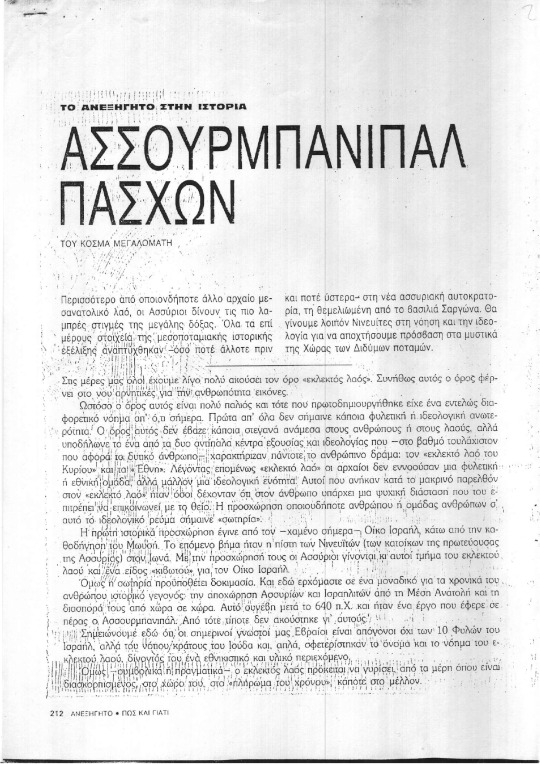

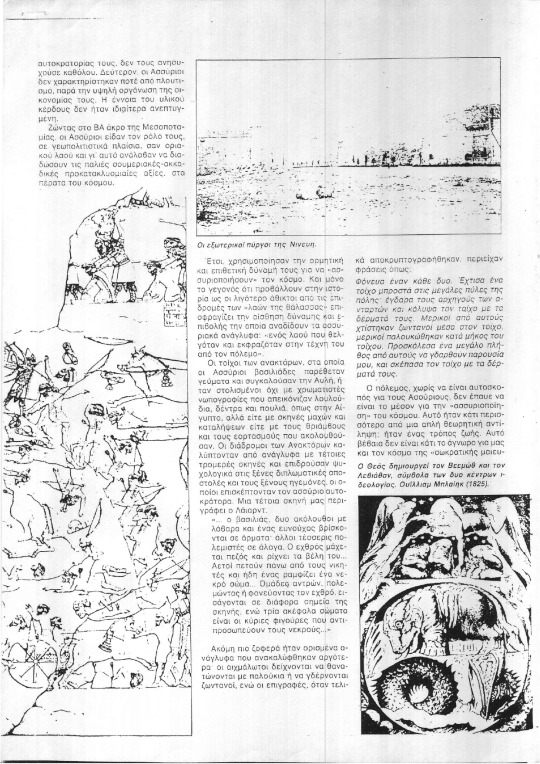
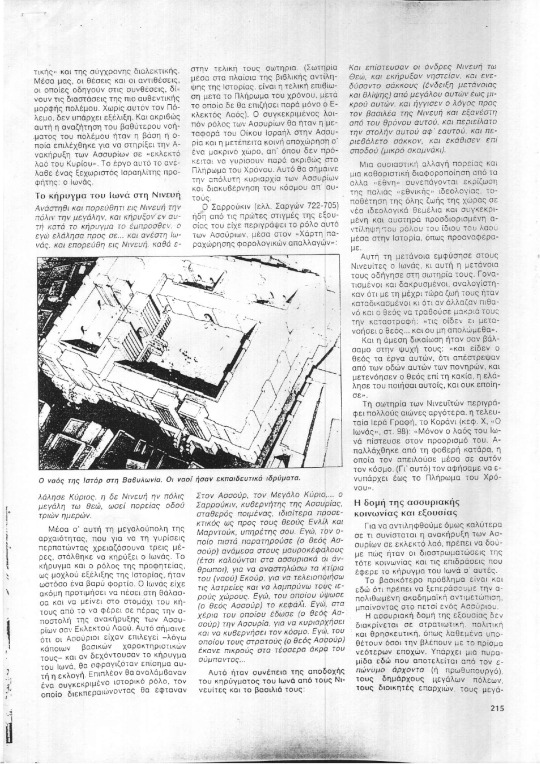
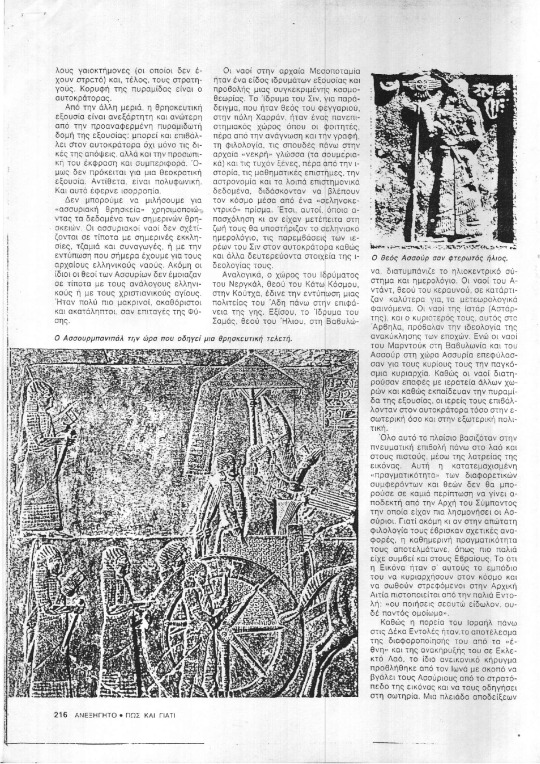
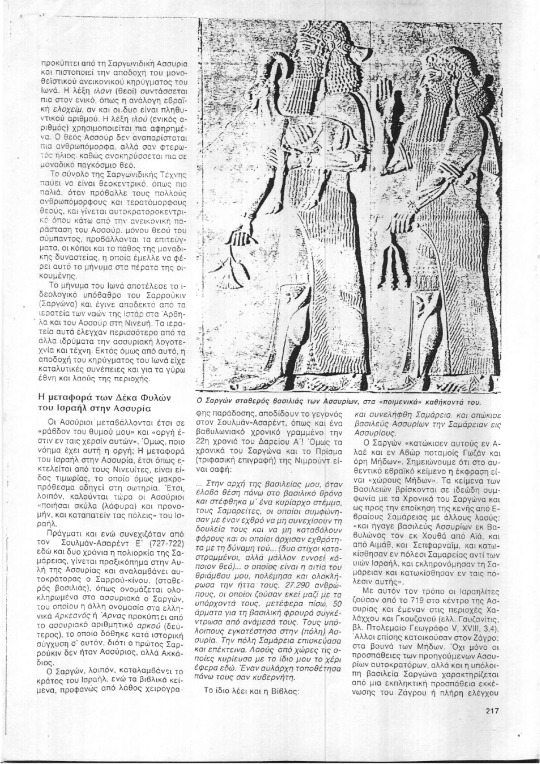
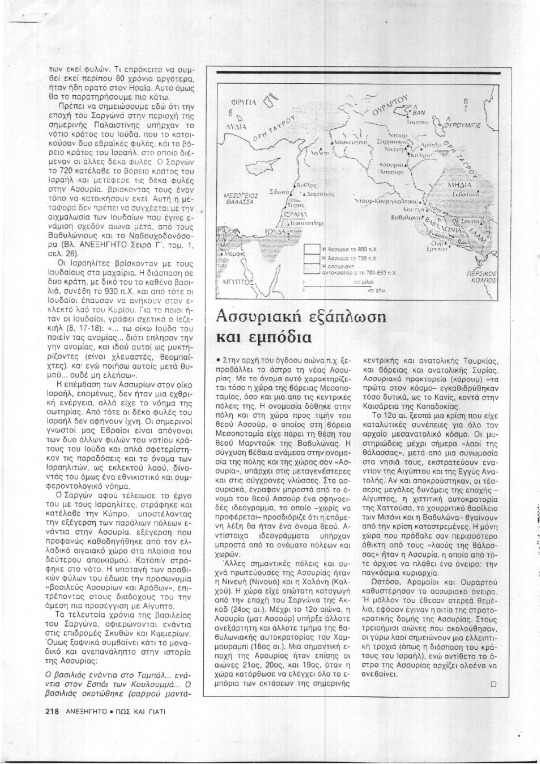
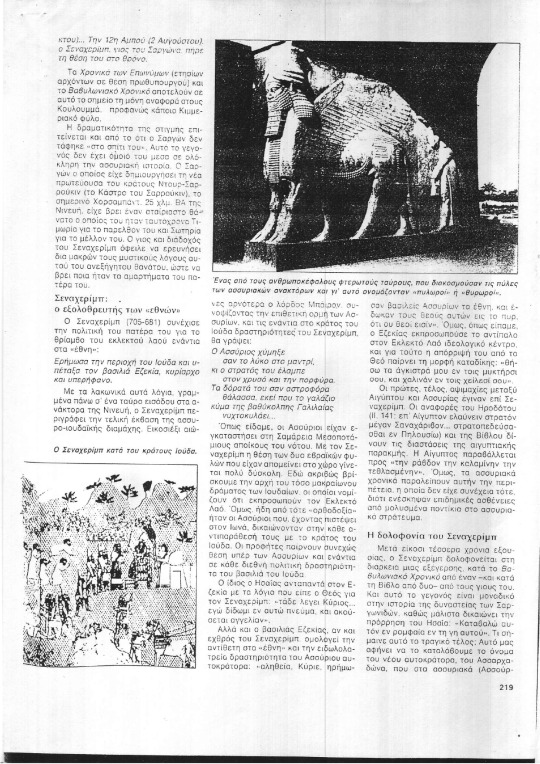

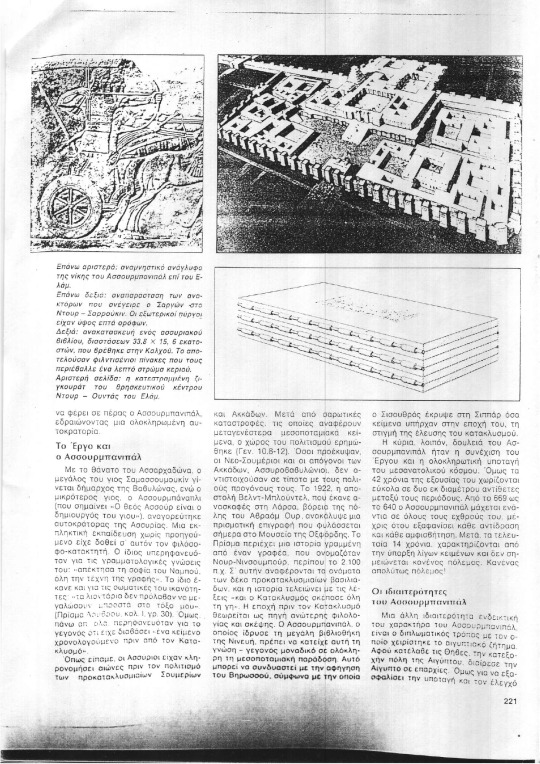
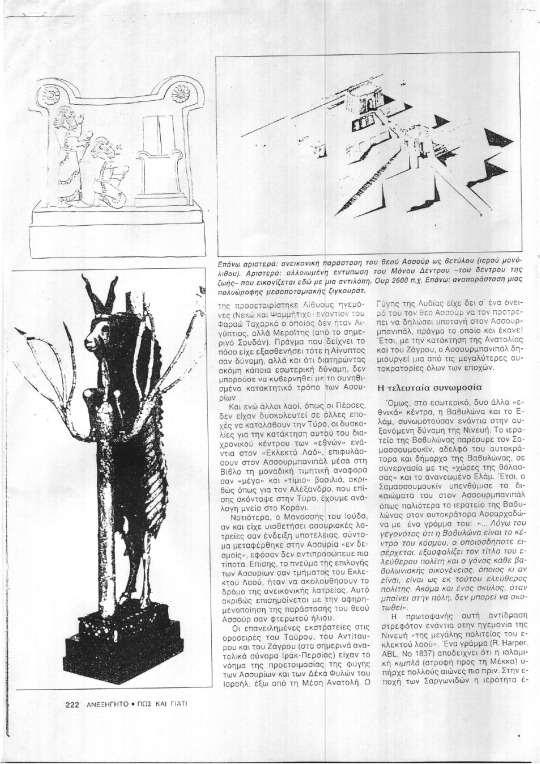

----------------------
Κατεβάστε το άρθρο: / Download the article: / Скачать статью:
#Assyria#Assurbanipal#Ashurbanipal#Esarhaddon#Sennacherib#Sargon II#Sargon of Assyria#Sargonid dynasty#Assyrian Empire#Mesopotamia#Babylonia#Eam#urartu#Arameans#Ασσυρία#Ασσουρμπανπάλ#Νινευή#Προφήτης Ιωνάς#Σαργωνίδες
0 notes
Text
Isaiah 7: The Lord Will Whistle
Because King Ahaz and his people had refused to trust God, a day of reckoning was scheduled on their calendar, and its date was In that day. #InThatDay #AssyrianArmy #FulfilledProphecy
God had publicly proclaimed that it was the Lord who would direct the Assyrian armies to bring judgment, one-by-one, to all three kings, and all three lands, for the same ill pervaded them all, the fatal illness of idolatry.
Sobering Prophecy
God had declared that both Egypt to the south, and Assyria to the north would come in like a swarm. King Ahaz had chosen to trust in worldly means. But…

View On WordPress
#2 kings 24:13-16#2 kings 25:8-12#Ammonites#arameans#assyrian army#Chaldeans#exil#Isaiah 7:17-25#King Ahaz#moabites#Nebuchadnezzar
1 note
·
View note
Text
Daily update post:
Yesterday, a suicide drone crashed in the Golan Heights. The IDF estimates that it was launched from Syria (though earlier, there was an Iranian funded militia in Iraq that claimed responsibility for firing at a target in the Golan Heights). the alarm didn't go off, and it wasn't intercepted, which is a reminder that no warning and defence system, not even the best one, is impenetrable. There was then a wave of sirens going off through Israel's north, likely because of debris from the interception, falling on different commeunities.
Today, another attack drone was intercepted over Israel's north. Over the area where my paternal grandparents lived, when they were still with us. Thankfully, there are no known injuries, but on top of that, there were no less than five more warnings of a drone crossing into Israel. If there will be no diplomatic solution for the situation in the north, meaning if the world doesn't intervene and FINALLY implement UN resolution 1701, which says that Hezbollah will not operate next to the Israeli border, or anywhere south of the Litani river, then things will get worse. One Israeli Aramean expert I was listening to, was talking about how much ammunition, and how many weapons, Hezbollah has aimed at Israel. Let's put it this way, they make Hamas look like kids.
Three more soldiers were killed in Gaza yesterday. We get news like this every single day now. Usually we get the names once or twice a day (morning and evening), depending on how many have died. You see people tense up around the time when the news is about to drop. I wanted to share with you that Israeli civilians have starting doing something so often, that it's almost like a new custom. When people learn about where a funeral will be held, they stand by the sides of the road with Israeli flags, to escrot the fallen soldier on his or her last journey, even when they didn't know the soldier at all.
youtube
I wrote a whole post about why Oct 7, despite all of the differences, and the fact that there is no comparison, bears similarities for Jewish people to the Holocaust. I was reminded of that post again today. I saw a vid with Holocaust survivor and famous Israeli actress, Lea Koenig. Knowing of her history, when I heard the start of her testimony, I was sure I was listening to her recounting her experiences during the Hoolocaust. It turns out that no, she's reading a testimony from Oct 7. The fact that some of these testimonies are indistinguishable should explain why the massacre, shocking as it is all on its own, is also deeply triggering for Jews. Here's the vid:
instagram
Australia says it will look into whether an Australian citizen who was killed in an Israeli counter strike in Lebanon yesterday, was a Hezbollah terrorist, as the organization claims. If he was, then fighting for a terrorist organization (as Hezbollah is defined in Australia) is a criminal offense under Australian law.
The IDF has destroyed a whole network of terror tunnels underneath the Rantisi hospital in Gaza. It says the length of the tunnels is several kilometers. Reminder: it's a war crime to build a terror tunnel underneath a hospital. It is NOT a war crime, to act against the terror tunnel used to attack a country's innocent civilians, even if it is built underneath a hospital.
youtube
This is 19 years old Agam Berger.

On Oct 7, she was kidnapped to Gaza. Her family identified her in a vid posted by Hamas, as she was being led away, handcuffed, and with blood stains on her pyjama pants (left side of the pic). Her father said that as released hostages talked about sexual abuse, Agam's family are terrified for her. He also wanted people to know that she was a gifted violinist, and used to volunteer with people who have special needs. So, in accordance with his wishes, here is Agam playing Leonard Cohen's Hallelujah on violin:
(for all of my updates and ask replies regarding Israel, click here)
#israel#antisemitism#israeli#israel news#israel under attack#israel under fire#israelunderattack#terrorism#anti terrorism#hamas#antisemitic#antisemites#jews#jew#judaism#jumblr#frumblr#jewish#Instagram
70 notes
·
View notes
Note
aren't israelis colonizers? is israel any different from india with respect to kashmir?
I don't know enough about India and Kashmir to answer that part, so I won't
But in short, no, Israelis are not colonizers.
As a longer answer, I think first it's important to draw a distinction between colonization and colonialism. Colonization has a pretty broad application. In its simplest sense it means "people moving from one place to another place and establishing some sort of autonomy there". It usually involves the suppression of indigenous peoples, but not always. We talk about, for example, "colonizing Mars", even though there's no one up there as far as we can tell
In that sense, sure, you can call Israelis colonizers. You'd be ignoring the millions of Jews who are descended from the Old Yishuv (the Jews who lived in British Palestine prior to the establishment of the state of Israel), unless you think that pre-Israel Jews were also colonizers, in which case I don't think there's a discussion to be had. You'd also have to ignore the millions of non-Jewish Israeli citizens, such as Bedouin Arabs, Druze, Samaritans, Chinese, Arameans, etc.
You'd also have to ignore the roughly 850,000 Jews who were expelled from Arab-dominant countries and fled to Israel as refugees, not as settlers. "Israeli" is a pretty broad term, it turns out
In terms of colonialism it's pretty much impossible to fit any definition to Israel. Colonialism is the process of exporting a dominant culture from a centralized point at the expense of indigenous cultures. For example, when the British established colonies on Turtle Island, the colonizers brought their British culture with them. They spoke English, worshiped God and The King in that order, used British pounds, established settlements with names like "James' Town" and "George Town", followed English law, and generally made a mess of the place. In contrast, when the First Aliyah came to British Palestine, they shed their European names in favor of their Jewish ones. They abandoned English, German, Yiddish and Ladino in favor of Hebrew, the last surviving Canaanite language. They built cities named things like Tel Aviv, and Shmuel HaNavi. For the first time in centuries, they visited the tombs of our ancestors–Avraham, Yitzchak, and Ya'akov. They made pilgrimages to the very cities spoken about in the Torah, our founding document and the source of our ethnogenesis. They found Jewish artifacts thousands of years old. Some people call this "artificial self-indigenization", but they're wrong. It's not even re-indigenization, because indigenous identity has no expiration date. Jews may have assimilated into various cultures around the world to some extent or another, but our identity as Jews has always been tied to the Levant. No colonial project in history has viewed itself as a return to a place from which they originated.
This isn't to say that Israelis haven't committed atrocities against Palestinians, or that they don't continue to do so. Theft of Palestinian homes, the Nakba, the suppression of the rights and culture of Palestinians, all of that history is reprehensible and needs to be answered for. But violence does not a colony make.
here's a piece from the left-wing Israeli news outlet Ha'aretz talking more about it
#ask#anonymous#I was gonna go into more detail about the Balfour Declaration the White Paper the Peel Commission etc but honestly I'm a little to hungover
30 notes
·
View notes
Note
Hi, I wanted to thank you for your post about the distinction of Judeo-Aramaic and Aramaic. I wanted to share that I have ended up becoming friends with some Assyrians who feel a strong sense of kinship with Jews due to their modern situation and have had some really interesting conversations with them.
I also wanted to say, it's an important distinction because by misnaming Judeo-Aramaic "Aramaic" people may not realize there are separate but related languages still spoken and used by modern-day Arameans, Assyrians, and Chaldeans, usually written in the Syriac script, which are considered neo-Aramaic languages.
I hope you don't mind my asking, I have recently been interested in understanding the shift from the paleo-Hebrew alphabet to the Hebrew alphabet used now, do you have any good resources for the history of that change? It's also okay if you don't know or don't have time/energy to answer.
I'm glad you like my post! Yes, a lot of people don't realize that Aramaic variations are still spoken today, and that Aramaic is its own language distinct from Hebrew.
So the short answer for the shift from Paleo-Hebrew script (which is most similar to Pheonician script) to current Hebrew script (Ktav Arami) has a lot to do with the Babylonian colonization of ancient Israel and Judea.
Here is a diagram I found showing the evolution of Hebrew script:
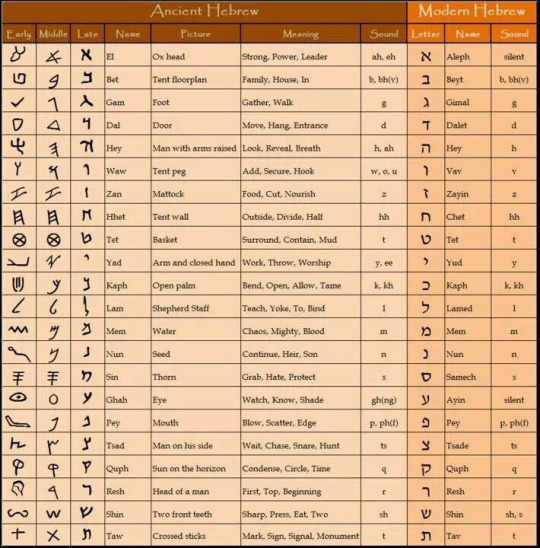
If you notice, early Hebrew script is indistinguishable from Pheonician
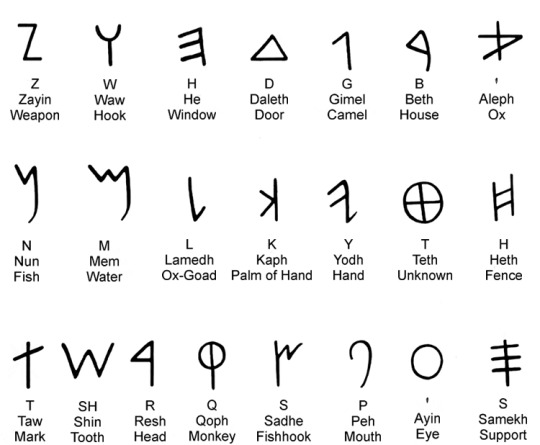
While later Hebrew looks a lot more like Aramaic

And then the Hebrew alphabet evolves further into the alphabet we recognize today.

But the old Aramaic script is actually preserved in Hebrew script. While more modern Hebrew text is used in official printing, the handwriting native Hebrew speakers (including myself) looks a lot more like the Aramaic alphabet
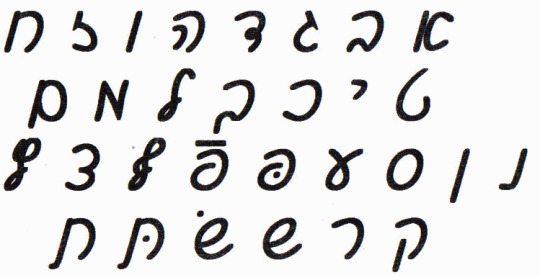
Sephardic script, or "Rashi Script", another script of Hebrew used in the middle ages, also draws similarities with the Aramaic alphabet
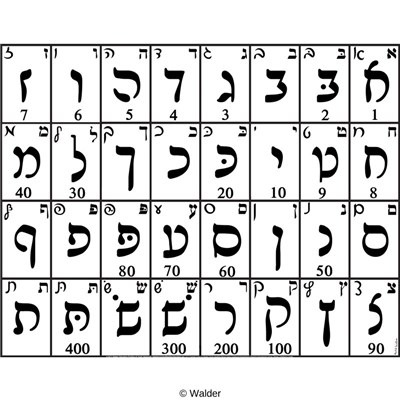
Basically, alphabets change over time. The Pheonicians were longtime trade partners with the Ancient Israelites, so it makes sense that they'd have the same alphabet. Then, the Babylonians invaded many many years later. Aramaic turned to Judeo-Aramaic to become the language of the Jewish diaspora, which influenced the alphabet. The alphabet evolved further into a distinct alphabet, but the Aramaic influence remains in the handwriting.
Some articles I recommend for more reading:
About the evolution of Hebrew
About "Rashi Script"
About Jewish diasporic languages
About Aramaic in Jewish History
About the Hebrew Alphabet and its spiritual significance
About Judeo-Aramaic
About the importance of Hebrew
Enjoy!
[note: very very brief image descriptions in alt text]
#hebrew#aramaic#language#linguistics#jumblr#judaism#jewish language#jewish culture#hebrew alphabet#jewish history
204 notes
·
View notes
Text
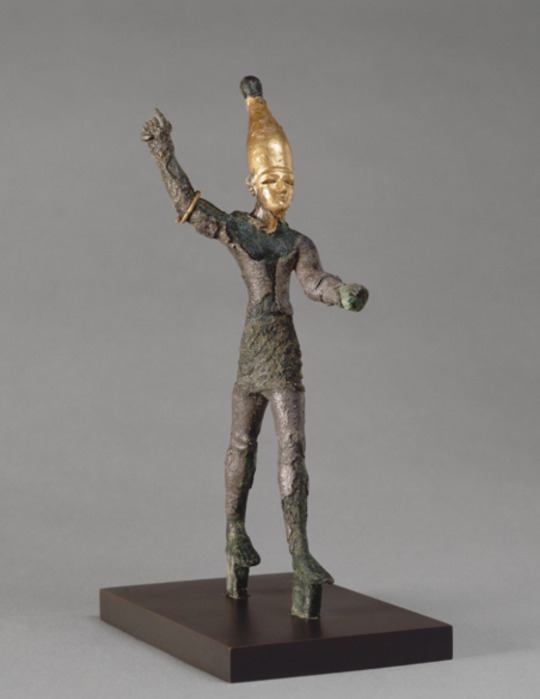
Bronze statue of Baal Hadad
Ugarit, Syria
c. 1200 BCE
Source: The Louvre
#canaan#canaanite#canaanite paganism#canaanite polytheism#canaanite gods#phoenician#phoenician paganism#phoenician polytheism#phoenician gods#ugarit#ugaritic#aramean#aramean paganism#aramean polytheism#aramean gods#natib qadish#pagan#paganism#polytheism#magic#witchcraft#occult#baal#balu#hadad#hadu#baal hadad
37 notes
·
View notes
Text
David and Solomon’s Biblical Kingdom May Have Existed After All, New Study Suggests - Archaeology - Haaretz.com
https://www.haaretz.com/archaeology/2023-11-15/ty-article/david-and-solomons-biblical-kingdom-may-have-existed-after-all-new-study-suggests/0000018b-cddd-d518-a39b-fffd773b0000

View On WordPress
#10 century BC#10th century BC#11th century BC#1300 BC#13th century BC#1960s#1990s#900 BC#925 BC#9th century BC#Aramean#Assyrian#bible#Bronze Age#Canaan#Canaanite#Circa 950 BC#Damascus#Egypt#Gath#Gezer#Hazael#Hazor#I Kings 9:16#Iron Age#Iron Age IIA#Israel#Israel Stele#Israelites#Jerusalem
0 notes
Text
Naaman the Aramean of Aram-Damascus
Naaman the Aramean of Aram-Damascus- or ” On Wednesday”
The story of Naaman is one of Cleansing and Redemption, one, of the few words spoken by a Hebrew Maid, a vessel of the Lord the God of Israel; of wise servants and villains; of Prophets and kings.
We find four of our characters in the city of Aram in Syria they are Naaman, his wife, her maidservant, and the king ben Haddad II.
The other…

View On WordPress
#2 kings 5#Ben Haddad II#Elisha#King Joram#Naaman the Aramean#Sick of soul#Supra-natural Metzora#Zaraath
0 notes
Photo

The Miracle of the Ax Head
1 The sons of the prophets said to Elisha, “See now, the place where we live and meet with you is too small for us. 2 Please let us go to the Jordan, and each man take a beam from there, and let’s make us a place there, where we may live.”
He answered, “Go!”
3 One said, “Please be pleased to go with your servants.”
He answered, “I will go.” 4 So he went with them. When they came to the Jordan, they cut down wood. 5 But as one was cutting down a tree, the ax head fell into the water. Then he cried, and said, “Alas, my master! For it was borrowed.”
6 The man of God asked, “Where did it fall?” He showed him the place. He cut down a stick, threw it in there, and made the iron float. 7 He said, “Take it.” So he put out his hand and took it.
The Aramean Attack Is Thwarted
8 Now the king of Syria was at war against Israel; and he took counsel with his servants, saying, “My camp will be in such and such a place.”
9 The man of God sent to the king of Israel, saying, “Beware that you not pass this place; for the Syrians are coming down there.” 10 The king of Israel sent to the place which the man of God told him and warned him of; and he saved himself there, not once or twice. 11 The king of Syria’s heart was very troubled about this. He called his servants, and said to them, “Won’t you show me which of us is for the king of Israel?”
12 One of his servants said, “No, my lord, O king; but Elisha, the prophet who is in Israel, tells the king of Israel the words that you speak in your bedroom.”
13 He said, “Go and see where he is, that I may send and get him.”
He was told, “Behold, he is in Dothan.”
14 Therefore he sent horses, chariots, and a great army there. They came by night, and surrounded the city. 15 When the servant of the man of God had risen early, and gone out, behold, an army with horses and chariots was around the city. His servant said to him, “Alas, my master! What shall we do?”
16 He answered, “Don’t be afraid; for those who are with us are more than those who are with them.” 17 Elisha prayed, and said, “Yahweh, please open his eyes, that he may see.” Yahweh opened the young man’s eyes; and he saw: and behold, the mountain was full of horses and chariots of fire around Elisha. 18 When they came down to him, Elisha prayed to Yahweh, and said, “Please strike this people with blindness.”
He struck them with blindness according to Elisha’s word. 19 Elisha said to them, “This is not the way, neither is this the city. Follow me, and I will bring you to the man whom you seek.” He led them to Samaria. 20 When they had come into Samaria, Elisha said, “Yahweh, open these men’s eyes, that they may see.”
Yahweh opened their eyes, and they saw; and behold, they were in the middle of Samaria. 21 The king of Israel said to Elisha, when he saw them, “My father, shall I strike them? Shall I strike them?”
22 He answered, “You shall not strike them. Would you strike those whom you have taken captive with your sword and with your bow? Set bread and water before them, that they may eat and drink, and go to their master.”
23 He prepared a great feast for them. When they had eaten and drunk, he sent them away, and they went to their master. So the bands of Syria stopped raiding the land of Israel.
Ben-hadad’s Siege of Samaria
24 After this, Benhadad king of Syria gathered all his army, and went up and besieged Samaria. 25 There was a great famine in Samaria. Behold, they besieged it, until a donkey’s head was sold for eighty pieces of silver, and the fourth part of a kab of dove’s dung for five pieces of silver. 26 As the king of Israel was passing by on the wall, a woman cried to him, saying, “Help, my lord, O king!”
27 He said, “If Yahweh doesn’t help you, where could I get help for you? From of the threshing floor, or from the wine press?” 28 The king said to her, “What is your problem?”
She answered, “This woman said to me, ‘Give your son, that we may eat him today, and we will eat my son tomorrow.’ 29 So we boiled my son, and ate him: and I said to her on the next day, ‘Give your son, that we may eat him;’ and she has hidden her son.”
30 When the king heard the words of the woman, he tore his clothes. Now he was passing by on the wall, and the people looked, and behold, he had sackcloth underneath on his body. 31 Then he said, “God do so to me, and more also, if the head of Elisha the son of Shaphat stays on him today.”
32 But Elisha was sitting in his house, and the elders were sitting with him. Then the king sent a man from before him; but before the messenger came to him, he said to the elders, “Do you see how this son of a murderer has sent to take away my head? Behold, when the messenger comes, shut the door, and hold the door shut against him. Isn’t the sound of his master’s feet behind him?”
33 While he was still talking with them, behold, the messenger came down to him. Then he said, “Behold, this evil is from Yahweh. Why should I wait for Yahweh any longer?”
— 2 Kings 6 | World English Bible (WEB)
The World English Bible is in the public domain.
Cross References: Genesis 19:11; Genesis 21:19; Genesis 37:17; Genesis 50:10; Exodus 8:3; Exodus 15:25; Leviticus 26:26-27; Leviticus 26:29; Deuteronomy 28:53; Ruth 1:17; 2 Samuel 14:4; 1 Kings 18:4; 1 Kings 20:1; 1 Kings 21:27; 2 Kings 2:12; 2 Kings 4:1; 2 Kings 5:23; 2 Kings 7:1; 2 Kings 24:2; Isaiah 8:21; Jeremiah 11:18; Luke 21:20; Romans 8:31; Romans 12:20; Hebrews 11:34
#the axhead floats#Elisha captures the blinded Arameans#the siege and famine of Samaria#2 Kings 6#Book of Second Kings#Old Testament#WEB#World English Bible
4 notes
·
View notes
Text
The RO List
This is a long time coming.
This is a list of confirmed ROs in the game. So far I’ve focused on love interests who your MC will meet early on in the game. Love interests from other kingdoms like Assyria, Babylon and one of the Aramean states have yet to be included.
In the game, marriage is about political gain. So your MC is suppose to marry for an alliance and not because they simply love the other person. While most love interests can be romanced by both male and female MCs, a marriage will only be recognised between heterosexual couples. But gay couples can have a private ceremony to affirm their relationship.
DISCLAIMER! Your MC can choose not to marry and be single. They can choose to monogamous to one person. Or they can decide to have numerous nameless concubines to bear children for them. It’s really up to you.
Now on to the list.
The Companions:
The first group of ROs are your three companions you’ll meet shortly after getting out of prison.


Name: Najim/Najima [M/F]
Race: Ghoul
Magic Type: Blood Manipulation, Shapeshifting
Description: Your friendly neighbourhood ghoul. N is the one who helps you out after you escape from prison. He/She sees your potential and is willing to go the extra mile for you. N doesn’t mind cracking a few skulls or eggs in order to secure back your throne. But don’t expect them to open up to you in the beginning. N has a past that they’d like to keep hidden.
Political Power: N doesn’t have a family to help you. In fact, N would be reluctant to marry your MC because it would cause a scandal. Even though N is a jinn, they are a wrong type of jinn. Ghouls are not seen in the best of light in the kingdom. Their shapeshifting ability has given them a bad reputation because shapeshifting is mostly used for espionage and assassination jobs.

Name: Leila [F]
Race: Qarin
Magic: Earth Manipulation
Description: Leila comes from a merchant family. But times have been hard for her family as trade routes have been monopolised in the kingdom and only those politically connected to the elites get good trade routes.
Leila is an excellent negotiator and can sell anything to anyone. Like any good merchant she has detractors who accuse her of being a charlatan and swindler who sells fake jewelry at highly inflated prices. But she never let’s criticism get in her way of securing the bag.
Political Power: Leila has contacts around the kingdom. Even though her family isn’t super rich, their wealthy enough and well-connected enough to assist you in reclaiming your throne. They won’t help you out for free but they expect the MC to pay them back.

Name: Zaki [M]
Race: Marid
Magic: Water Manipulation
Description: Zaki is currently a fisherman. He comes from a family of mercenaries. He spent years fighting for others in foreign lands. But he got sick and tired of the bloodshed. After the death of his younger brother, he decided to return to Jinnestan and live a simple life. But his simple life will become complicated when he helps the MC out and gets embroiled in the conflict between the MC and the vizier.
Political Power: Zaki comes from a good family. His family knows how to fight and can help the MC out in a war situation. The tribe Zaki comes from is known for their bravery. That’s why in the kingdom they’re hired to protect caravan routes from bandits.
The Betrothed:
You’ll first meet these two ROs during your twelfth birthday party. Your father wants to solidify your right to the throne. And has decided a good betrothal will put you in a good position.
The player is not forced to marry the person they’re betrothed to. After the incident that occurred in MC’s birthday party, the player is free to choose whoever they feel will secure them the throne.

Name: Raita [F]
Race: [Depends on MC’s Race Choice]
Magic: [Depends on MC’s First Elemental Power]
Description: Raita is your cousin from your father’s side. She’s known to be reserved and mostly keeps to herself. Raita is an excellent gardener and spends her free time tending to the plants in the palace. Surprisingly, your uncle finds Raita to be so non-threatening that she can go in and out of the royal palace without first seeking permission . But even though she’s quiet, she’s aware of her precarious position in court and tries hard to not arouse attention to herself. Raita however makes sure to keep notes on what goes on in the palace.
Political Power: Raita comes from the MC’s family tribe but is from a different clan than the MC. She’s your second cousin to be specific. A marriage with her would solidify your family’s support of you and de-legitimise the vizier.

Name: Qaus [M] (*NB: I’ve yet to change his name currently in demo)
Race: Half-Jinn, Half-Nephilim
Magic: Levitation
Description: Qaus is the second eldest son of the king of Edom. He believes he’s better than his brother and therefore should rule Edom. But his father has other plans. So most of the time his bored and spends reading scrolls from scholars. He longs for adventure and a chance to prove himself to his father.
Political Power: Qaus is a prince. A marriage with him would create an alliance between two kingdoms. Such an alliance would be beneficial for the MC. But it also poses a risk as Edom frequently comes into conflict with Israel and could drag Jinnestan into it if the MC is not careful.
High Risk, High Reward:
So this marriage would be very controversial and has many pitfalls for the MC. But if MC plays their cards right, you can end up on top. So here are two siblings from the second powerful tribe in the kingdom.

Name: Suhail [M]
Race: Hinn
Magic: Wind Manipulation
Description: Suhail is known to be carefree. He loves going out and partying hard. Coming from a very rich and powerful family, he organises a party every week in his house. Most people don’t take him seriously. He’s seen as a goofball, a guy who likes cracking jokes at inappropriate times. And Suhail prefers having people think he’s not a serious threat.
Political Power: Suhail belongs to the second most powerful tribe in the kingdom. During the war of unification, Suhail’s tribe opposed MC’s father and allied themselves with other tribes who didn’t want Arabia to be united. But at the final battle against your father, Suhail’s tribe switched sides in the middle of fighting. They betrayed their allies and launched a surprise attack from the rear against their former allies.
This would hand a total victory to your father. And MC’s father decided to reward Suhail’s tribe for switching sides. Over time, the tribe became more powerful and richer. They’re pretty much distrusted by most people in the kingdom for their dishonorable act. But a marriage with them will give you a powerful ally. So powerful that they could consume the MC in their web if the player is not careful.

Name: Samar [F]
Race: Hinn
Magic: Wind Manipulation
Description: Unlike her brother, Suhail, who enjoys partying all the time, Samar tries to get people to take her seriously. She spends her free time writing and publishing poems and stories. She organises poetry competitions at her home and provides financial support for young artists in the capital. Samar uses most of her income for charitable ventures like building orphanages and giving aid to poor widows.
She’s trying hard to repair her family reputation the best she can. But she can be vindictive. She’ll use her power and influence to crush anyone who mocks or speaks ill of her family.
Political Power: Again just like her brother, she belongs to a powerful tribe. A tribe that could help MC instead of supporting the vizier.
And that's it for now. The re-write is chugging along well
17 notes
·
View notes
Note
don’t worry at all about that obvious awful racist antisemitic and islamophobic fascist user @shre\tl “Throughout history a great diversity of peoples has moved into the region and made Palestine their homeland:
Canaanites, Jebusites, Philistines from Crete, Anatolian and Lydian Greeks, Hebrews, Amorites, Edomites, Nabateans, Arameans, Romans, Arabs, and Western European Crusaders, to name a few. Each of them appropriated different regions that overlapped in time and competed for sovereignty and land. Others, such as Ancient Egyptians, Hittites, Persians, Babylonians, and the Mongol raids of the late 1200s, were historical 'events' whose successive occupations were as ravaging as the effects of major earthquakes ... Like shooting stars, the various cultures shine for a brief moment before they fade out of official historical and cultural records of Palestine. The people, however, survive. In their customs and manners, fossils of these ancient civilizations survived until modernity—albeit modernity camouflaged under the veneer of Islam and Arabic culture.”
this is true for colonized peoples the world over, and their “phd” needs to be publicly questioned and impeached.
Thank you for this .. I know I sound like an angry stupid person in that post but I really know my history better than them.. and I lied about the phd because theirs is questionable so 🤡 why not make fun of them
12 notes
·
View notes